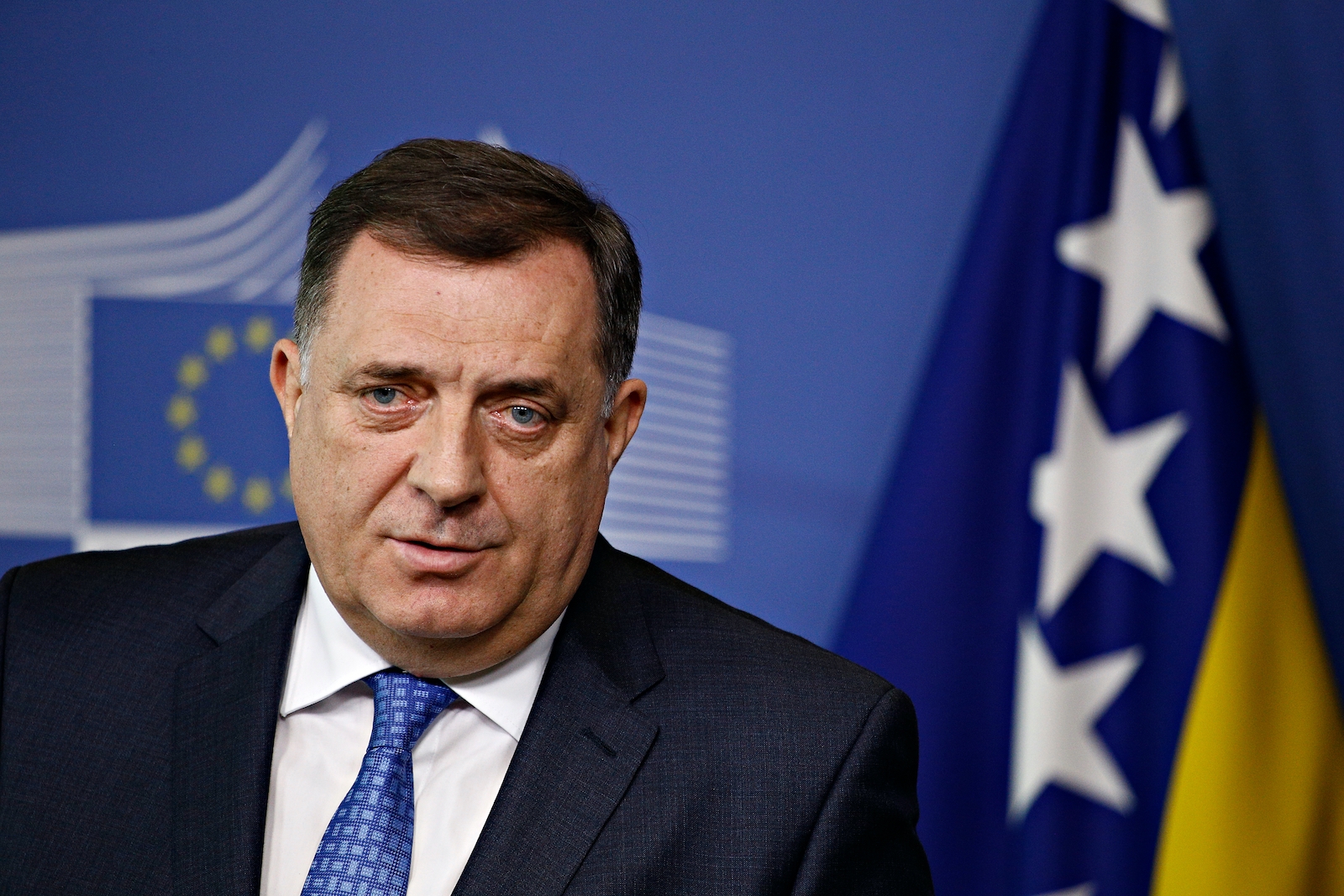
Fool Me Twice: The Role of the U.S. and the EU in Bosnia’s Constitutional Reform
In early September, I wrote that Bosnian Serb strongman, Milorad Dodik, might make good on his promise to secede his region of Republika Srpska from the rest of Bosnia and Herzegovina. Since then, Dodik has taken steps to pull out of state institutions and has made tentative moves to create his own. Other ethno-nationalists predictably responded in similarly belligerent terms. Many analysts have described this turn of events as Bosnia’s worst war scare since the end of the ethnic conflict 26 years ago. So, what did the U.S. and the EU do to respond to this crisis? They decided to give the nationalists a stake in the future of the country.
The U.S., the EU, and electoral and constitutional reform in Bosnia
Two weeks ago, Matthew Palmer, the U.S. Special Envoy for Electoral Reform in Bosnia, and Angelina Eichhorst, an official of the EU’s diplomatic service, traveled to Bosnia to convene a second round of joint talks between mainly ethno-nationalist parties on constitutional and electoral reforms in the country.
These two issues are perennial. The Bosnian constitution established a power-sharing arrangement that is as dysfunctional as it is complex. The institutions are difficult to jump-start, easy to stall, and—once stopped—almost impossible to restart. Not only that, but the nature of power-sharing is such that it is always exclusionary and discriminatory; in this case against everyone not identifying with the three largest ethnic groups that are doing the power-sharing.
This dour beast requires mighty weaponry to tame. But Palmer and Eichhorst brought none. Instead, the so-called “electoral reform and limited constitutional reform process” is merely based on facilitation, with Palmer and Eichhorst bringing no proposals of their own to the table. And they have brought no incentives for the ethno-nationalists to swallow the bitter pill of reform either.

Unsurprisingly, the first round of talks was hijacked and hollowed out by demands for further ethnic gerrymandering and Dodik’s absurd proposal to consolidate two high-level positions into one person—himself. That the second round of talks achieved absolutely nothing was par for the course. The party leaders palavered about everything from how to elect the members of the three-member state presidency (one from each major ethnic group) to electronic voting—and agreed on nothing. It was less a parley than a prattle.
All this despite Antony Blinken’s letter to the ethno-nationalists whose sole purpose was to drive home the limitedness of the limited reforms: “We have seen earlier reform efforts fail…by trying to do too much at once.” Blinken might have (un)wittingly been referencing another episode in the chronicle of constitutional reform in Bosnia.
Bosnia’s constitutional déjà vu
It is a testament to history’s impeccable comedic timing that 12 years ago, on the very week Palmer and Eichhorst touched down at the Sarajevo International Airport, another pair was about to take off. Unlike Palmer and Eichhorst, these officials were as senior as the ethno-nationalists would ever get—Carl Bildt, representing the Swedish presidency of the EU, and James Steinberg, U.S. Deputy Secretary of State. Forget a letter, then-Vice President Joe Biden himself traveled to Bosnia four months earlier to personally urge for constitutional reform.
Though the wider political context was no more auspicious than now. As Louise Arbour noted at the time: “Bosnia is today in political, if not literal, turmoil.” The timing of the talks, as well, was as inopportune as now—only a year before general elections, an excuse often used by ethno-nationalist to justify their intransigence. But the mediators clearly sketched out the potential benefits of the talks. Success meant accelerated integration into the coveted EU and NATO.
According to Secretary of State Antony Blinken, the #UnitedStates, which brokered #Bosnia’s 1995 peace accord, may impose sanctions against entities that try to unilaterally withdraw from state institutions or destabilize the deal.
— Dragoş Ioniţă (@DragosIonita) November 17, 2021
Bildt and Steinberg were also, incidentally, convening the second round of the so-called Butmir process of constitutional reform, named after suburbs near Sarajevo where a NATO military base is housed—the site of the talks. The military base quickly drew unwanted comparisons to Wright-Patterson airbase in Dayton, Ohio, where the war drew to a negotiated end in 1995—which was framed as the international community coaxing out a “Dayton 2”. Another excuse in the making. But Bildt and Steinberg went ahead with their plan anyway.
So they gathered top guns from seven (mainly ethno-nationalist) parties and sat them down at the Butmir military base. The participants at Butmir were almost identical to the ones Palmer and Eichhorst would assemble 12 years later. Not much has changed since then. But unlike now, the mediators did not shy away from the comprehensiveness of the comprehensive reforms that Bosnia needed. They put a reform package that the U.S. and the EU themselves had drawn up in front of the party leaders. The Butmir package of reforms included creating a more powerful unicameral legislature, a bona fide prime minister with a cabinet, and all but dissolving the discriminatory tripartite state presidency. In short, Bosnia would have started to look less like a power-sharing and more like a parliamentary system.
So it was only natural that the Butmir package was roundly rejected. All but one of the seven parties rejected it. It was a resounding disaster. Bildt and Steinberg promised to return. They never did.
Back to the future
Comparing these two reform processes is a long-winded way of looking at the lessons learned over the years. The two processes are stunningly similar—from the participants to the timing of the talks—yet different enough to see an obvious change of mind in the U.S. and the EU. One comprehensive, prepared and presented by the international mediators, with EU and NATO memberships as dangling carrots. The other limited, with mediators merely facilitating the talks and dangling an IOU. One had Biden, the other has Blinken. Both were held during some of the worst political crises the country had seen. Quite soon, we might look back and conclude that both failed.
So what went wrong at Butmir and what will go wrong for Palmer and Eichhorst? The problem lay not in limited, or in comprehensive reform; neither in less, nor in more proactive mediation; rarely in the timing of the talks, and never in the mise-en-scène. The problem is that the ethno-nationalists are not candid interlocutors. They haven’t the slightest interest in changing the nature of the power-sharing system that benefits them greatly. Passing any and all reforms would be akin to sawing off the branch they are sitting on—or at least gnawing away at it. They use these gatherings—conveniently staged before general elections—for self-promotion, grandstanding, and even more nationalist drivel. The presence of international officials only serves to deodorize their behavior. What the U.S. and the EU should do instead is empower and support civil society actors, genuine reformist movements, and talk to those at the other end of the discrimination stick.
The Butmir process had barely even started when Dodik said that he “is not interested in constitutional reform,” just as he made clear to Palmer and Eichhorst that he “does not expect anything from the meeting”—a roundabout way of saying “I’m not interested” again. And why would he be? The international mediators should take Dodik and other ethno-nationalists at their word. Already, Palmer and Eichhorst have announced that they will return to continue the talks with the ethnopolitical elites. They shouldn’t.

